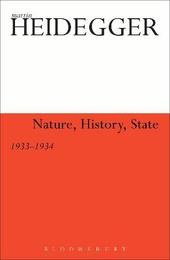
|
Nature, History, State: 1933-1934
Hardback
Main Details
Description
Nature, History, State: 1933-1934 presents the first complete English-language translation of Heidegger's seminar 'On the Essence and Concepts of Nature, History and State', together with full introductory material and interpretive essays by five leading thinkers and scholars: Robert Bernasconi, Peter Eli Gordon, Marion Heinz, Theodore Kisiel and Slavoj Zizek. The seminar, which was held while Heidegger was serving as National Socialist rector of the University of Freiburg, represents important evidence of the development of Heidegger's political thought. The text consists of ten 'protocols' on the seminar sessions, composed by students and reviewed by Heidegger. The first session's protocol is a rather personal commentary on the atmosphere in the classroom, but the remainder have every appearance of being faithful transcripts of Heidegger's words, in which he raises a variety of fundamental questions about nature, history and the state. The seminar culminates in an attempt to sketch a political philosophy that supports the 'Fuhrer state'. The text is important evidence for anyone considering the tortured question of Heidegger's Nazism and its connection to his philosophy in general.
Author Biography
Martin Heidegger (1889-1976) is regarded as one of the twentieth century's most important philosophers. Gregory Fried is Professor of Philosophy at Suffolk University, Boston, USA. Richard Polt is Professor of Philosophy at Xavier University, Cincinnati, USA. Contributors: Marion Heinz, Theodore Kisiel, Peter Eli Gordon, Robert Bernasconi, and Slavoj Zizek.
ReviewsThere is no more disturbing or haunting event in philosophy's recent history than that defined by Heidegger's political activities in the 1930s. Those activities and the questions they raise will cast a shadow for a long time to come. The protocols of Heidegger's seminar - precisely translated and thoughtfully introduced - coupled with the excellent critical essays that constitute this volume are decisive texts for those who seek to understand this difficult matter. -- Dennis J. Schmidt, The Pennsylvania State University This collection ... is an important document in the battle for determining Heidegger's legacy as either one of the most profound minds of the 20th century, or a charlatan abusing his philosophical credentials to provide intellectual justification for Nazism. With this accessible translation re-published in paperback form, English audiences can read the primary text and wade into this important debate in Heidegger scholarship for themselves ... [T]his publication does a service in filling a vital part of the picture. -- Richard J. Elliott * Philosophy *
|